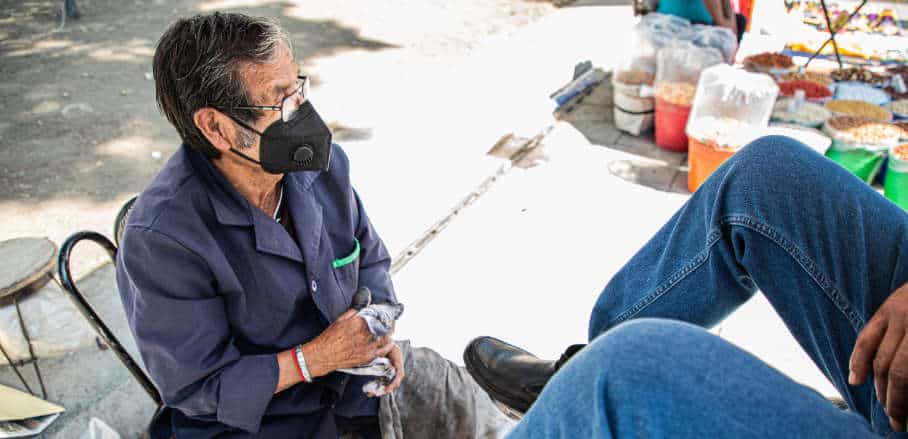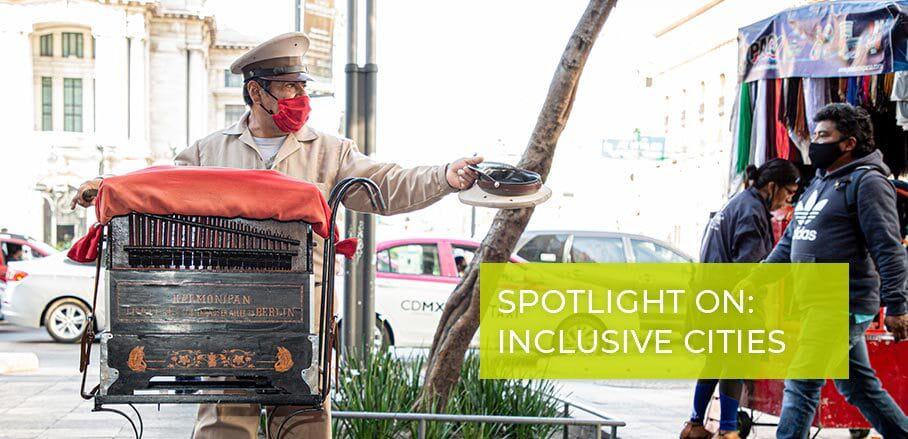Right to the City: Informal Workers and Public Space in Mexico City
The informal economy contributes significantly to the wealth of many cities worldwide, but local legislators rarely recognise the rights of informal workers to use public space. Tania Espinosa Sánchez from WIEGO shares critical insights from Ciudad de México.
“Public Space cannot be used to obtain private benefits because it is a public good“. This argument is commonly used against informal workers in public spaces. Many believe that public space should be used only for mobility, considering anything else as an obstacle that should be removed. Informal workers have been proving them wrong.
Public Space is an essential good for informal workers such as street vendors, shoe shiners, organ players, and others, who use it to earn a livelihood. These workers make invaluable social contributions to cities – in some cases carrying on ancient cultural traditions. They also contribute to the economy: In 2019 in Mexico, 56 per cent of the workforce worked in the informal economy, contributing to 23 per cent of the gross domestic product of the country (INEGI, 2019). This means that for every 100 Mexican pesos of the gross domestic product, 23 pesos were produced in the informal economy.
Promising Standards in Theory…
In 2017, Mexico City finally adopted its first Constitution, a significant step towards transforming the national capital into the country’s 32nd federal entity (giving it a degree of autonomy similar to that of the 31 Mexican states), including a Charter of Rights that contains several new rights that must be recognised and guaranteed by the city authorities.
The Constitution includes promising, progressive language on informal workers. It established that both salaried and non-salaried workers’ rights should be protected. It also mentions that a social security regime should be designed for non-salaried workers. Furthermore, it states that the development of these rights should be contained in secondary legislation drafted and approved by the local Congress which would also define special trading and folk culture areas within public space.

Street vendor in Mexico City during the COVID-19 pandemic © Cesar Parra/WIEGO
The Constitution was not the first time that a legal instrument was designed to protect informal workers’ rights. It happened before with Recommendation 204 from the International Labour Organization, called “The Transition from Informal To Formal Economy”, which defends informal workers’ right to work in public space in a regulated manner and establishes, for instance, that the regulation should be designed with the participation of workers. Another example of a progressive global standard for informal workers is the New Urban Agenda (NUA). Signatory countries commit to recognise the contributions of poor workers to the informal economy and support safe public spaces as well as the secure functioning of both formal and informal markets.
…And in Practice
There are clear, protective frameworks for informal workers’ rights, both at the international and local level. However, in practice, it has not been easy to see their rights protected. Although the city’s Constitution mandated the establishment of secondary legislation to enshrine informal workers’ rights into law by late 2019, the local Congress allowed the deadline to pass without taking action. Non-salaried workers continue to work under an outdated, discriminatory regulation from 1975.
The current regulation has ongoing, negative impacts on the lives of workers. For example, in 2017, shoe shiners located in the Insurgentes Roundabout were expelled by the police from the work zone they have used for decades because of “renovations”, as they are not allowed to work in renovated areas according to the existing non-salaried workers regulation. In this case, the shoe shiners Union, Women in Informal Employment Globalizing and Organizing (WIEGO), and Mexico City’s Human Rights Commission were able to successfully advocate for the workers to be allowed to return to their workplace, but this is rarely the case for other evictions.
During the pandemic, the situation has worsened. In some cases, authorities took advantage of the lack of clear and protective regulation and took actions that damaged informal workers’ livelihoods. For example, in Miguel Hidalgo Municipality, authorities confiscated dozens of tricycle vendors’ carts and then announced on social media that they would be destroyed. The argument for confiscating the workers’ carts was that they did not have a licence to be vending (mostly food) in the wealthy Polanco neighbourhood. Fortunately, the public was outraged by the announcement the carts would be destroyed. The public backlash led the municipality to back down and agree to return the carts to the vendors.

Shoe shiner in Mexico City © Cesar Parra/WIEGO
Public Perceptions: The Tide is Turning
The health and economic crisis has resulted in a shift in the public discourse around work in public spaces – with growing support for poor workers. Since the crisis has truly affected everyone in society, it has also made people more empathetic to the situation of daily earners – workers who work each day to put food on the table –without the privilege of staying at home to avoid contagion.
For example, the CDMX cyclist movement, which normally advocates for urban mobility without obstruction, was one of the first supporters of the mobile vendors who had their carts confiscated. Advocates from the movement argued that the vendors contribute to sustainable mobility in the city as they use tricycles to work. Also, since they move from one place to another to vend, they are not an obstacle for anyone.
The public’s perception of the strong, negative impact of the crisis on poor informal workers was not wrong. From a global study conducted by WIEGO in 12 cities around the world, we know that the average number of days worked by informal workers in Mexico City has almost halved: from approximately 5 days a week in February 2020, it has dropped to 2.6 days in April. As a result, informal workers’ earnings have decreased by 45 to 80 per cent, and only 24 per cent of the surveyed workers received economic support from the government.
Building Back Better from COVID-19
The pandemic has revealed the fragility of the working conditions and livelihoods of informal workers in the city, and it has increased the urgency for clear and fair regulation, as mandated by the city’s Constitution. It is not only necessary to have legislation that contemplates a continual process of regularisation, formalisation and integration of informal workers in urban public spaces, fiscal matters, public health and social security, as stated in the local Constitution – but it is also critical for informal workers to be completely involved in its design.
The legislation should incorporate elements that reflect the lived realities of informal workers and improve the conditions that they currently face. Additionally, it must be accompanied by public policies that facilitate the recovery of informal workers: cash grants, loans, the implementation of the minimum living wage contained in the Constitution and their inclusion in the economic recovery plan of the city.
We have seen the capacity of the government to shift the city’s approach towards public spaces – during the pandemic, restaurants have been allowed to put tables on the sidewalks to keep their businesses alive. Informal workers have always known that valid use of public space is beneficial for economic development, and they will now claim their part.
- Right to the City: Informal Workers and Public Space in Mexico City - 15. April 2021
